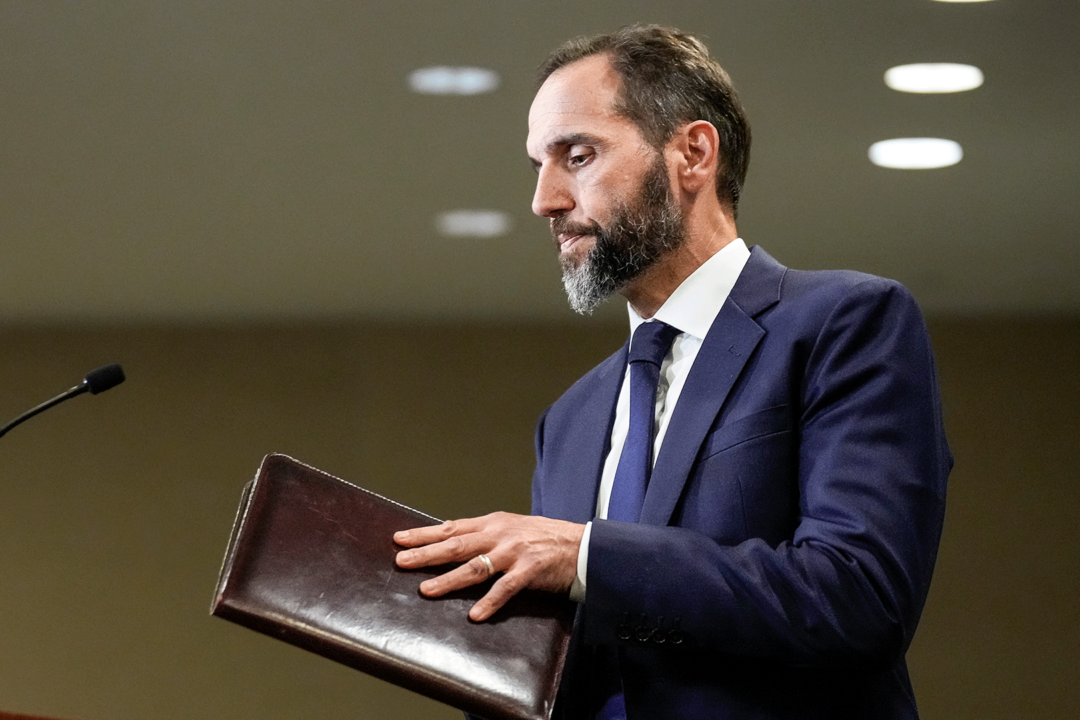Jack Smith requested the dismissal, stating that he didn’t think the constitution required dismissal with prejudice.
District of Columbia Judge Tanya Chutkan dismissed the election interference case against President-elect Donald Trump on Nov. 25, bringing an end to a highly contentious prosecution and raising questions about whether the charges could once again surface.
Chutkan’s dismissal was entered “without prejudice,” which means the charges can hypothetically be brought against Trump at a later date.
Special Counsel Jack Smith based his request for a dismissal on longstanding Department of Justice (DOJ) policy that says prosecution of a sitting president would violate the constitution. Smith’s motion added that “although the Constitution requires dismissal in this context, consistent with the temporary nature of the immunity afforded a sitting President, it does not require dismissal with prejudice.”
Analysts say it’s unlikely, however, that Smith’s indictment would be filed again given that the statute of limitations will run out before the expected end of Trump’s second term in 2029.
“The fact is that asking the judge to dismiss the case without prejudice is common practice,” John Shu, a constitutional law expert who served in both Bush administrations, told The Epoch Times. “The government wants to keep all of its options open, even if those options are remote or if it’s likely that the options will expire because of the statute of limitations.”
Smith’s reference to temporary immunity was about a type of immunity that was separate from what the special counsel’s office and Trump’s attorneys were debating in recent months. That litigation focused on immunity that stemmed from the Supreme Court’s decision in Trump v. United States.
That decision held that presidents enjoy varied levels of immunity from criminal prosecution for actions they engage in during their tenure, including for former officeholders like Trump.
Smith’s argument about the DOJ’s longstanding policy, by contrast, focused on the prosecution of a sitting president. Smith added that his request for dismissal was “not based on the merits or strength of the case against the defendant.”
Shu told The Epoch Times that Smith’s motion pointed to an attempt by him to preserve other future prosecutions.
“Smith and the DOJ are not just thinking about the current case, they’re thinking about future cases,” he said. “They still want to keep the option open of prosecuting in the future—not Trump but, in the future, some former president, even though the Supreme Court made that significantly harder with its presidential immunity opinion.”
In her opinion explaining the dismissal, Chutkan said her decision was consistent with Smith’s interpretation of Trump’s immunity while in office. She also said that dismissing without prejudice was appropriate in this case because “there is no indication of prosecutorial harassment or other impropriety underlying the [motion to dismiss].”
Even if Trump left office early and the prosecution resumed, it’s unclear how successful it would be.
The Supreme Court’s decision on Trump v. United States arose from an appeal of Smith’s prosecution, which has been mired in a delayed pre-trial process since he brought the initial indictment last year. Chutkan’s court was headed towards deliberations over how that decision applied more specifically to Trump’s actions.
Besides the immunity issue, Trump also sought to challenge the case on statutory grounds and the legitimacy of Smith’s appointment as special counsel.
The latter issue is the subject of an appeal by Smith in the U.S. Court of Appeals for the 11th Circuit, which is reviewing Florida Judge Aileen Cannon’s decision that constitutional issues surrounding Smith’s appointment meant his classified documents case against Trump should be dismissed.
Smith filed a motion on Nov. 25 to dismiss his appeal as it related to Trump but sought to leave it in place for two other defendants involved. The 11th circuit granted Smith’s motion on Nov. 26. Also on Nov. 26, Smith’s team filed a brief defending Smith’s appointment as legal.

